
Photo by Terrence Cao
In making their final college decision, students must face the reality of not getting into their dream schools, forcing them to make the best choice for themselves based on their options.
Late nights spent editing essays for the 10th time.
Visits to campuses across the country during breaks.
Trying to bolster a resume.
Trying to avoid constant comparisons.
Trying to cope with the constant pressure.
Sometimes, the college admissions process can seem like a stressful marathon, and applicants can be swept up in the mix of expectations, hopes and fears if they’re not careful.
Associate Director of College Counseling Phoebe Butler believes that, because of preconceived notions of success or lofty expectations, students can pigeonhole themselves into only considering a limited range of options, leaving them unaware of other potential possibilities because of internal or external pressures.
“Parents can be a big worry,” Butler said. “Because of the financial investment of the school, they almost expect a certain outcome that usually doesn’t mean a state or public school. Kids have a similar worry, but they’re more worried that they won’t get into a highly selective school because of the outcomes of previous years.”
Instead of focusing on general outcomes or trends, Butler suggests that students should focus on building themselves up as people, not just applicants to a school. By focusing on what they can control, students will find success naturally in whatever form that means to them.
“College admissions is just so individualized,” Butler said. “There’s all this comparison, but people have different qualities and life stories. You can’t recreate that magic, and a lot of people at independent schools end up not worrying enough about finding the right fit for them.”
Additionally, Marksmen have a range of options available to them that don’t follow the traditional college path–service academics, gap years and trade schools are all progressive possibilities that Butler believes students should consider before reaching a formal decision.
“We’re sending more and more kids to places we’ve never sent anyone before,” Butler said. “They’re paving the path for future Marksmen and making those colleges possible. At this point, non-traditional pathways aren’t really non-traditional.”
Choosing to follow one of these unorthodox paths, senior Hans Hesse has enlisted in the United States Armed Forces, citing his personal beliefs as his motivation to pursue this unique opportunity.
“I want to serve my country and defend the defenseless,” Hesse said. “My grandfather was in the military, and he was a pillar in my family: very strong, courageous and honorable. I see this decision as an opportunity to follow in his footsteps while doing it in my own way.”
Inspired by his grandfather and motivated by his desire to serve, Hesse has chosen to delay a traditional college education, which he currently plans on pursuing after concluding his time in the military.
“I think a lot of people try to rush into college,” Hesse said. “Even if they have no clue what they want to study, they just go to college because that’s what people will tell you. For me, that’s a pretty expensive gamble. If I know that I want to join the military, I might as well do that now and then take multiple gap years to figure myself out.”
Choosing to move away from the traditional path most students take after graduation hasn’t been easy, though, and Hesse has endured repeated criticism and doubt from others who believe he should change his decision. Instead of giving in to the criticism, Hesse used it as motivation to continue working hard, only gaining further conviction that he was making the right decision for his life.
“At first, my parents were hesitant,” Hesse said. “But through all the work I’ve done without them prompting me to wake up early or go to train, they’ve definitely become very supportive because they know that I’m serious about this. I’m not going into it without doing my research or being prepared, and I’m doing it for the right reasons.”
Hesse encourages other students who may not necessarily be confident in how they want to spend their adult life to consider non-traditional pathways to ensure that they’re usefully spending their time and not indecisively waiting for something to happen to them. He emphasizes the economic benefits, too, which many families can benefit from.
“I think that a lot of people lack that defining purpose, and they don’t really know what they want to do, which is fine,” Hese said. “It’s okay to an extent to figure that out in college, but I think that, if you have a person who’s willing to work hard, but they don’t know what they’re doing, taking a gap year or two or joining the military before spending all that money on college can be a good thing.”
Choosing what path to pursue after leaving the school can be stressful, but Butler encourages each student to consider their own personal motivations and values to help narrow down the wide range of options, and she emphasizes that, no matter what a student chooses to do, the College Counseling Office will always serve as a recourse for boys who need it. If students are following their passions with a plan, whether that be years of education at a university or pursuing a military career, they are on the right track.
“We try to set boys up with unyielding, unending support,” Butler said. “We’re always here for them, and I’ll fight whoever I need to to get the best thing for a kid at the end of the day.”